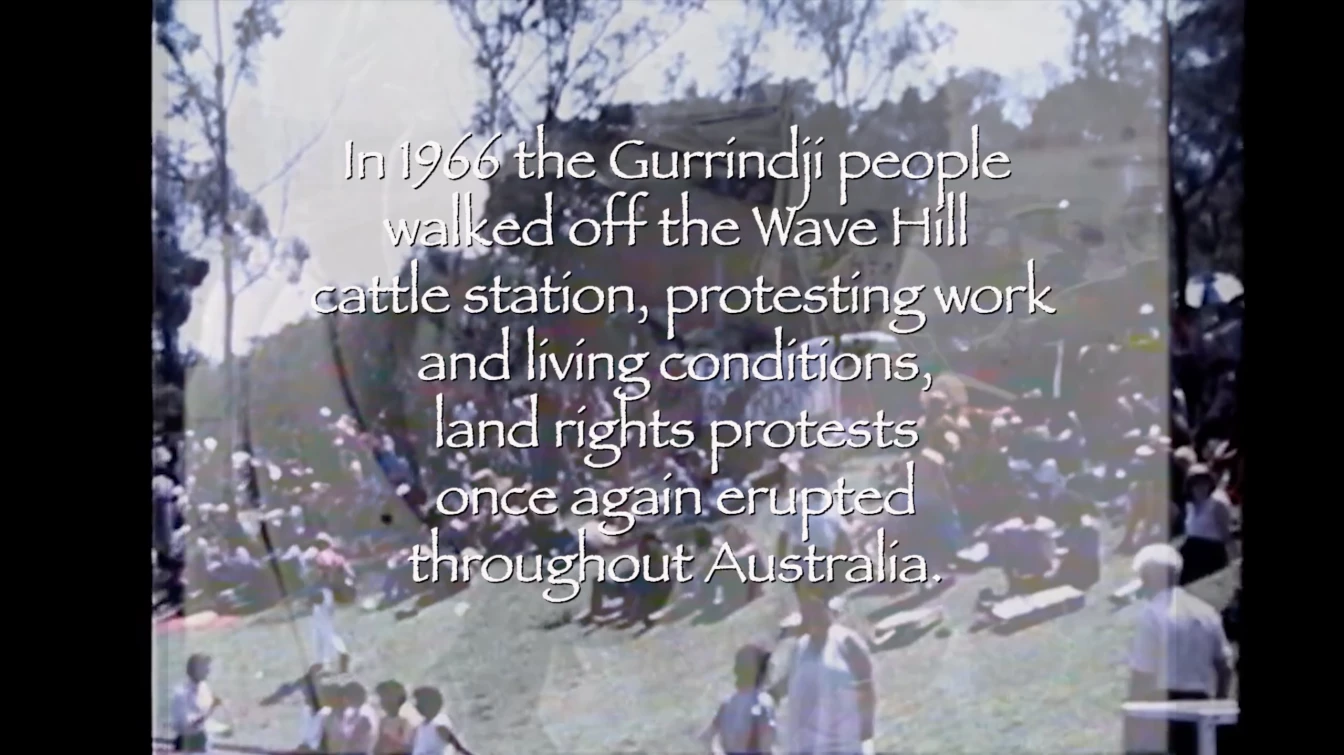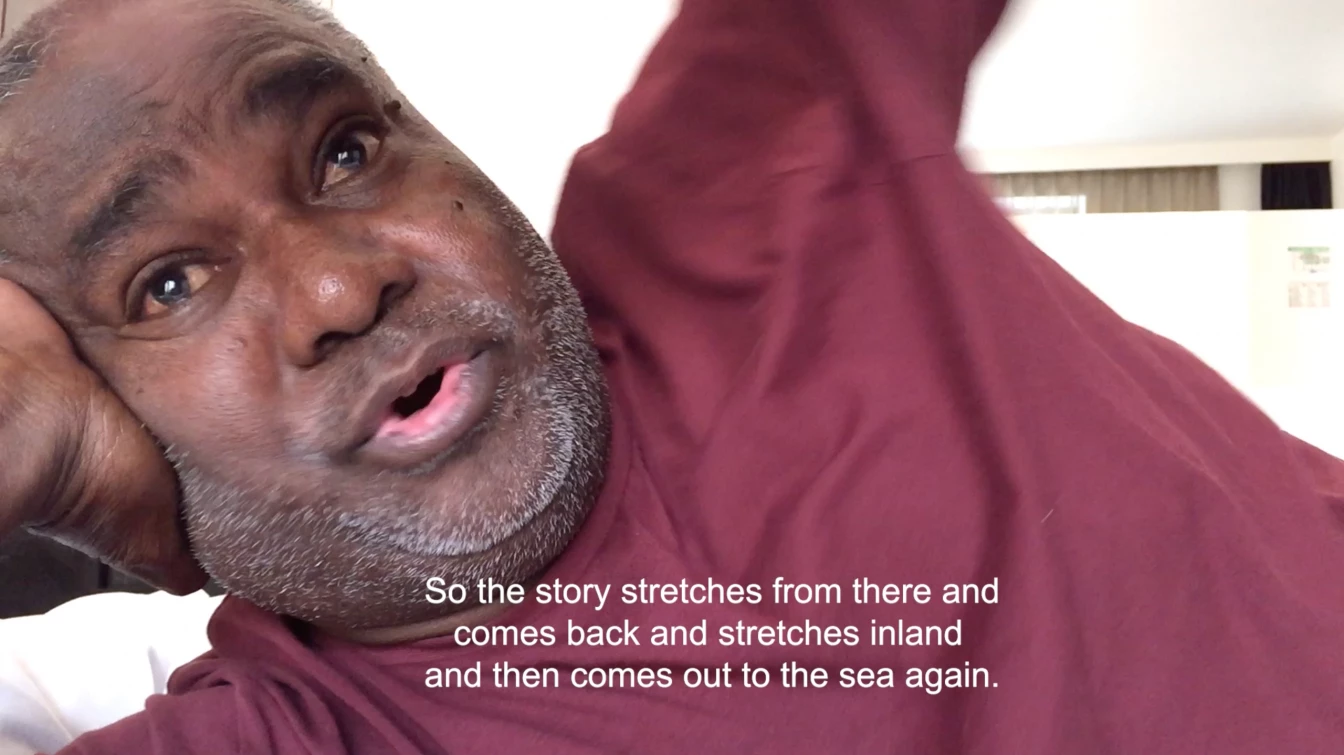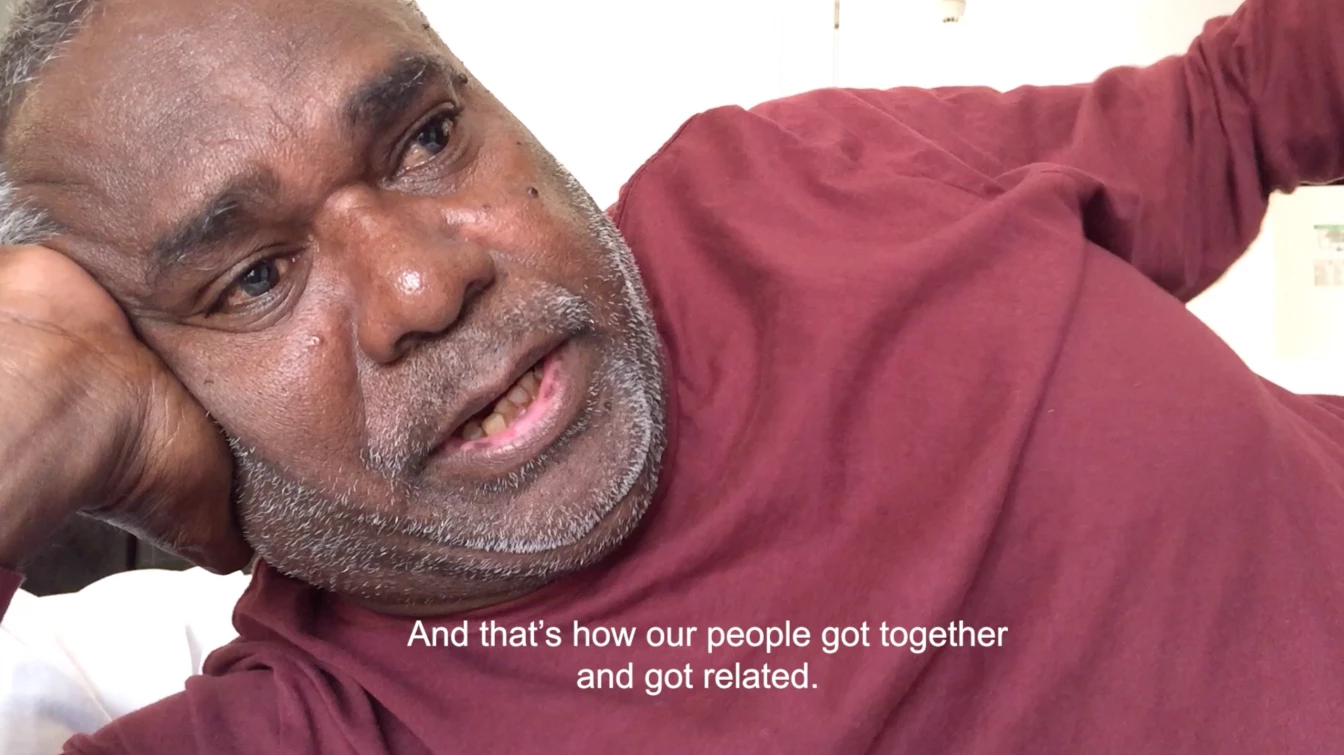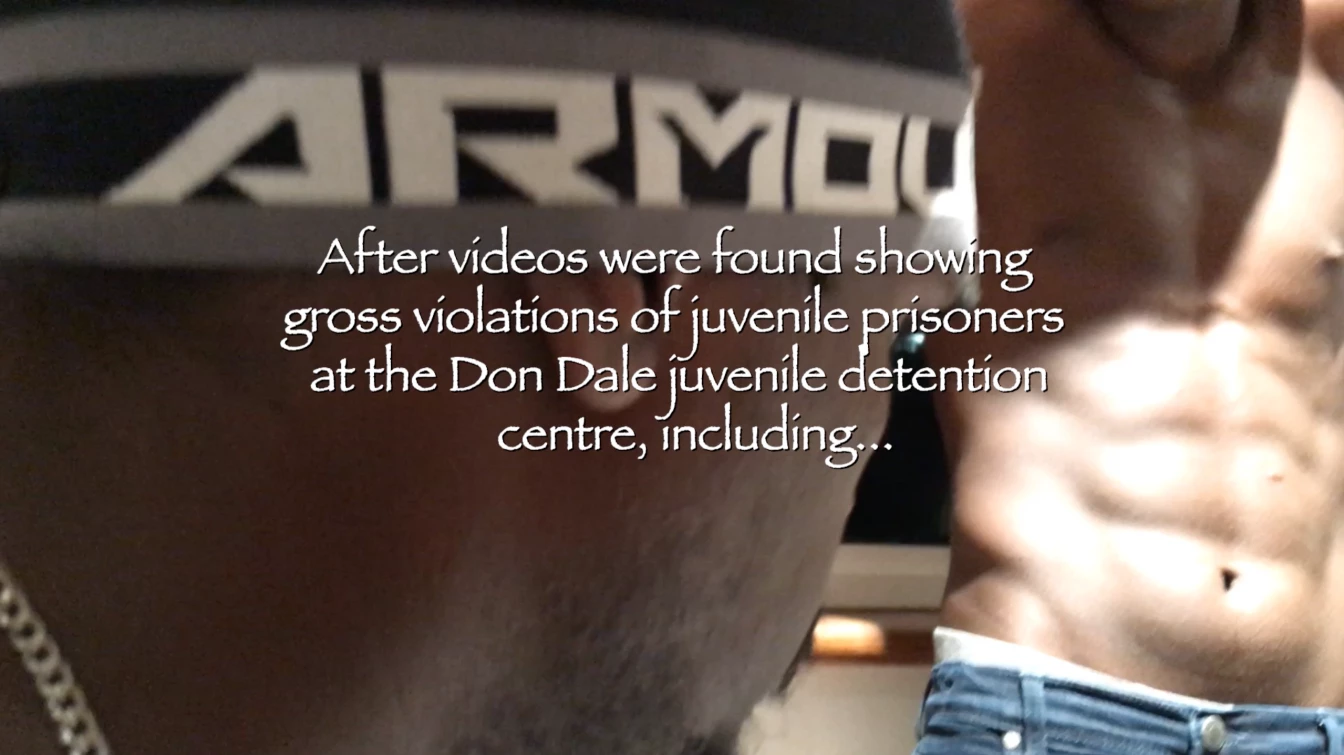A Conversation at Bamayak and Mabaluk, Part of the Coastal Lands of the Emmiyengal People
The following conversation between Rex Edmunds and Elizabeth A. Povinelli took place at Bamayak and Mabaluk, part of the coastal lands of the Emmiyengal people. They reached this remote territory by both bushwhacking a road through the area's highland forests and swamps with a group of Karrabing; others in the group come from adjacent coastal lands. Their conversation has been translated into English from the local Creole.
Elizabeth A. Povinelli: I got an invitation to write a piece from some folks in Europe, L'internationale Online, a mob of art European museums in Spain, Slovenia, Belgium, Turkey, Poland, the Netherlands, Sweden and Ireland, I think. They have a project called 'Our Many Europes'. They are interested in non-fascist forms of belonging to country. So I thought, why not have a conversation with you about our different patrilineal countries?
Rex Edmunds: Why would they be interested in that?
EAP: Well, in Hungary that have this guy called Orbán; and in Turkey, Erdoğan; and Russia, Putin; and the US, Trump; and Italy, Salvini. All these guys are pushing this idea that their nation should be just for 'us', not 'those other' people. They say that there is an original American or European or Turk or Russian and that the government should be protecting and advancing these people first and foremost (or only). America First, Hungary First, Russia First, Turkey First. When they say this, what they really mean is white Americans, European Hungarians, Russian Russians, etc. And it's not just these nations. Lots of other European nations have right-wing political parties gaining ground over the same idea. And so everyone is worried about fascism re-emerging. They wonder, can people have strong feelings for country, forms of belonging to a place, without becoming a fascist?
RE: Well, the first thing I would say is that really the whole of Australia is Indigenous. It belongs to us mob, to different Indigenous groups and the different ways they belong to their country. So what do they mean 'fascist'? What does that word mean?
EAP: People use the word both precisely and loosely. In a really simple way, I'd say that 'fascists' are those who believe that a place is only for one kind of person, like white or Christian or Hindu, or whatever. And that the government should work only on behalf of this one kind of person. Also, fascists spit on – English has the word 'denigrate' – others in order to build themselves up. And fascists claim that they are the original, true people of the place. The 1930s was when fascism took over Europe and other places: Hitler in Germany, Franco in Spain, Stalin in Russia and Mussolini in Italy.
RE: Your countrymen! So they think we are fascists if we say Australia is Indigenous?
EAP: That's why I wanted to talk with you – no, they don't. I don't either. I thought we could begin to show why by talking about what is similar and different between my village in the Alps and your country here at Bamayak and Mabaluk. We've talked about going to my village in the Alps for years now – as you know, Rex (Sing), Linda (Yarrowin) and Aiden (Sing) went there after our last Paris screening.
RE: Yeah, Rex was telling me about it – how they asked about what clan you were from and how you picked it up.
EAP: I told them I was part of the Simonatze clan of Povinellis and picked it up through my father's father's side; it goes as far back as anyone can reckon, since around the 1700s.
RE: White people have clans?
EAP: Some still do. Many did before, but then this way of life got wiped out.
RE: These people who are interested in some other kind of belonging, do they think clans are or aren't fascist?
EAP: That's what I want to talk about. Like we've discussed before, there are a lot of similarities between Carisolo and Bamayak and Mabaluk. I pick up my relationship to Carisolo through my father's father and follow the father-line all the way back. You pick up your relation to Bamayak and Mabaluk the same way. Carisolo is and isn't inside the nation of Italy: it has been at the frontier of warring empires and nations since records were kept.
The Carisolo clans talk about the tourists who flock into the area for skiing, hiking and biking as 'those Italians', because although Carisolo is now within the borders of the Italian state, Italians remain foreigners in some essential way. Bamayak and Mabaluk are also inside and outside Australia. Australia colonised them, but they remain yours and other Emmi's according to a way of belonging outside of nationalism. And I don't know, are settler Australians foreigners?
RE: They kind of are. But I have a question for you, does your mob in Carisolo have totems? Dreamings? Like we do?
EAP: Not anymore, if we did. Some people say that before Catholicism we had sacred trees and spirits. But that was sometime in the eighth century. At the church Santo Stefano in Carisolo there is a mural dating back to 1534 which shows Charlemagne (Carlo Magna) coming to Carisolo to convert the natives. People were given a choice, either give up your superstitions or have your head cut off. Or that's the legend.
RE: Remember when you, me, and Gavin were at Eindhoven that first time, talking with Annie Fletcher and Vivian Ziherl at Van Abbemuseum about maybe doing a show and we were looking at the artist's work ... what was her name? ... well, remember those pictures in the last room showing one group of white people slaughtering another group. It was wild. Like they showed what was going on in Europe during ... when?

Stills from The riot, Karrabing Film Collective, 2017.

Stills from The riot, Karrabing Film Collective, 2017.

Stills from The riot, Karrabing Film Collective, 2017.

Stills from The riot, Karrabing Film Collective, 2017.
EAP: The early part, eleventh century maybe, I think.
RE: One group was slaughtering the other group like a herd of cattle. Leg up hanging from a tree, guts being pulled out, hearts in one bucket, livers in another. But human beings! I was like shit. And that really got me thinking. If they treat each other like that...
And Annie said that this was part of the fighting between religions. So they were Catholics slaughtering other Christians, or the other way around – I can't remember. I started thinking, I've never heard any of the old people talk about this happening with us. Sure, people fought, speared each other, but mainly over a woman, or women might fight for a man with their fighting sticks. And if someone did something wrong like in a ceremony, they would definitely be punished, you know, the hard way. But just slaughtering each other like cattle. I was thinking, they did that and then they came to us and started doing the same.
EAP: That was the option Charlemagne supposedly gave to the villages in the Alps. Accept Catholicism or leg up. So no totems now, even if we had them.
Can we talk about why having a totem, or durlg in Batjemalh, therrawin in Emmi, might be interesting for the question of non-fascist forms of belonging to a country? Maybe you could talk about your totem and how it relates to your land?
RE: I am Mudi or what white people call Barramundi, a kind of fish. I saw it once on the menu in New York City! Anyway, my Mudi sits on the tip of Mabaluk; it's reef-shaped, like the tail of the fish. The point of Mabaluk is shaped like a mudi. I get the totem from my dad and he from his dad. It's the same way my dad's brother and their kids, like Natie (Natasha Bigfoot), pick it up. And so it's been ours since before the white people and right back to the dreaming time. And it still is. I don't know if it's right to say, but we're the chiefs. (laughing)
EAP: Ah, but smack on point. Maybe you can tell folks about what you and Linda (Yarrowin) were saying in the video we made for Natasha Ginwala's exhibition at the ifa-Galerie in Berlin, Riots: Slow Cancellation of the Future. You talked then about 'separate-separate and connected'. Maybe you can also talk about your totem and ceremonies like rag burning, kapug?
RE: Sure, my totem, my mudi is one of two sisters who were circling around a place called Bandawarrangalgen – this place is still there, as you know. As they were going around and around they made a dangerous whirlpool. They decided after a while – maybe they were jealous of something, maybe it was a man – that one would go upstream and become a freshwater barramundi and the other would stay in the saltwater; the saltwater one came to my land and sat down at Mabaluk. So these sisters are 'separate-separate'. They each have the place where they were and are now, but they are also connected because of this story and the land that their activity shaped into being the way it is today.
The film we did, The Jealous One (2017), is also about this kind of thing: why various ancestor totems ended up where they are today. But also how that thing, the spirit of the thing, is still in the people who come from that totem. So the durlg in the film, the sea serpent, is jealous for not being involved in a corroboree which the other totems were having, so he steals the fire and runs off into the sea and tries to drown it. And that's where the sea monster totem is today, belonging to the Bianamu mob. And that's why your brother Trevor has always been a jealous person. Other totems were involved and they are now in other places. (both laughing)
So it's like that: separate-separate but connected. You can and can't make them different. Like we talk about 'Karrabing' as meaning one of the tides, the low tide, which shows how various places are connected and different, as you can see the shape of the sand and the reefs and the deep channel waterways below the surface of the water. It's also what connects all of us. How can I take care of my land if you are destroying yours? I think white people are realising this with climate change and the poisons and plastic and radiation everywhere now. And fracking. They say, oh, we'll only frack in this little area, but the poisons might spread into the underground water.
EAP: I think rag burning might help outside people understand this idea of how everything was connected or joined together at the very beginning.
RE: You mean like when someone dies and it's your mother or father or brother or sister or son or daughter?
EAP: Yeah, people wouldn't have a clue.
RE: Well, if someone from your family dies we have the Christian funeral at the graveyard. If it's a ceremonial man or woman, then we also have a wangga to show respect. But, in any case, you keep the person's old clothes or stuff that has their sweat on them, the spirit of that person, you know. Then maybe after a year – should be a year or something like that – we have a rag burning. Like we did for Trevor's mum and Daphne's husband last year. Well, you need your uncle or aunt or cousin, in our way it's a cousin, like your mum's brother's kids or your dad's sister's kids to do the burning of the clothes. Because they are your aunt (father's sister) or uncle (mother's brother), they are always from another clan, so another country. Best if the uncle, aunt or cousins are close, but as long as it's connected in this way it's okay. How could I burn my mum's or sister's or father's clothes myself: no one who is in my totem group can touch those things during the ceremony. I am boss of them, but I cannot do it myself. I need my relations from that other totem or country.
I think you're right, white people don't understand this. White people, government law, they just look at the separate part. They give a little bit of land to this clan and a little bit of land to that clan. You're separated by this boundary – you are over here. So everyone has just a little bit of land and they don't think about all the connections which have always kept that land strong: ceremony; the actions of ancestors, like my mudi and her sister; and other things, like keeping the mangroves open and stuff. You can see how only recognising the separate-separate part fucks up everything when it comes to mining and royalties. Everyone just thinks about what they can get out of something. And as the poisons leak out, well, then, people start fighting each other, killing each other. Honestly, I think white people, lawyers maybe, or politicians, definitely miners, they do that on purpose: 'Ah, we'll let them rip each other apart.'
Before, we would settle the problem through ceremony, doing the ceremony or getting the marriage done which would create the possibility for bringing people together. People would fight, but then they'd get back together because they had to. This would make both countries stronger.
EAP: I have always found this super interesting when thinking about nationalism more generally and because of my own particular relation to Carisolo and Italy, or how I was raised by my grandfather and grandmother, who were both from the village. Grandpa, a Simonatze Povinelli, and Gramma, an Ambrosi (don't know which clan, but the Ambrosis were a smaller group).
Grandpa really drilled into our heads that we were in America and that was great for opportunity – he didn't think about the fact that our sense of possibility came from a genocidal displacement of Native peoples – but that we belonged to Carisolo. For him this was totally different from being from Italy or the US, because anyone could be from these places if they could get in and get citizenship. But we belonged to Carisolo on an entirely different basis: kinship and descent, the patrilineal, too. Maybe many would find that wrong, but there you go.
But the mode of belonging that the old people taught me and you and everyone in Karrabing, in which you have this foundational belonging, but also this foundational belonging that needs what is outside of it or next door or down the coast or inland, this was never a part of what my grandpa talked about.
RE: Our sweat is also part of this, our spirit. Our ancestors are in us and we are in the ground as we hunt and look after the land. Land recognises us if we keep working for it. You know when you go hunting you can feel it, the ancestors – the land is a part of you. Or maybe they punish you first if you haven't visited for a long time. Our third film Wutharr, Saltwater Dreams (2016) was about this, aye?
EAP: Like the first go at making this road.
RE: Yeah, so we were going really well, getting somewhere on that first day we were making it. And then, I don't know, I just felt the coast close by – and I knew not to drive over the pandanus trees – but something, someone, started spinning my head, playing tricks on me, come on just go. And then bang, my radiator bust. You ripped your fingers. Then you, Kelvin and Kieran were stuck on the road getting back.
But this time, it was easy. They opened the space for us. Like, Okay, so you didn't give up. You are willing to work for us, okay, we'll also make it easy. I think they think like that, the ancestors.
EAP: It's funny, because, again, so much resonates with what I hear about Carisolo and so much is different, too. For instance, the village and church are literally composed of our families' flesh and sweat, and no matter who dies everyone in the village has to walk up the hill to the original church, Santo Stefano, as a sign of respect to the family. And yet I have always said I am glad my grandparents migrated before World War II, because I don't know which way they would have gone under fascism. I just don't know. Part of me thinks you really have to have an idea of nationalism to have fascism.
RE: Meaning?
EAP: Let's say my father married a non-white woman from outside of the Alps and Italy and then had us. We would still belong to Carisolo through him and my grandfather. I am sure there would be some serious commentary, but there would still be this other form of belonging underneath. But nationalism says, you are or are not an Australian. On what basis? Shouldn't it just be citizenship?
RE: Aboriginal people didn't have citizenship till land rights, or before 1967 [reference to the 1967 referendum which gave the Australian federal government the power to count Indigenous people in the census and to legislate on behalf of Indigenous people].
EAP: Exactly, so if the original people aren't Australian, who is?
RE: White people. Europeans. The same people who slaughtered each other and then shipped themselves here.
EAP: And they can't get over that. Neither can Americans. The day after Trump was elected, I was heading to the subway in New York, heading up to school – it was beyond horrifying for so many of us. Anyway, this white guy is passing me on the street and talking over my shoulder to another guy. He said something about 'an Arab' who he'd just told, Trump's going to send you back to where you came from, buddy. I was still deranged and said, Why don't you go back to where you came from? Why don't we all? And he said, I am an American, full-blood. I said, You're European, like me. That's where it all started. I think nationalism starts as a European formation. It has always been about whites.
RE: All I can say is that Europeans had their chance to show what they can do. It's our time now.
The views and opinions published here mirror the principles of academic freedom and do not necessarily reflect the views or positions of the L'Internationale confederation and its members.